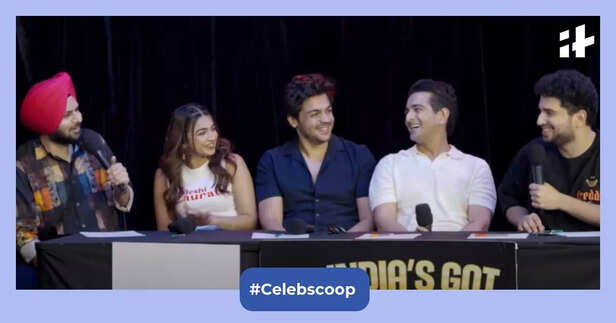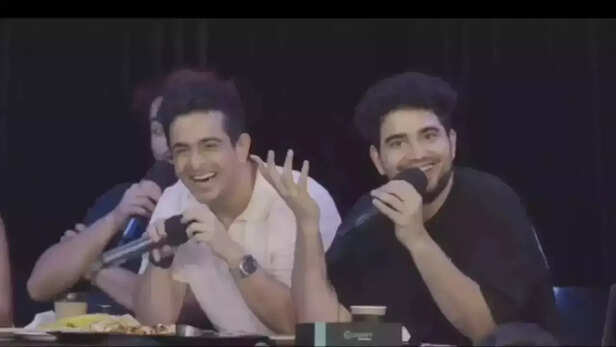The Dark Side of Comedy: What You Can’t Say in India
Nidhi | Feb 12, 2025, 16:06 IST
Samay Raina and Ranveer Allahabadia
( Image credit : Times Life Bureau )
n India, comedy walks a fine line between humor and legality. This article explores the legal limits of satire, free speech, and offensive content in the country. From landmark cases to current controversies, it sheds light on what comedians can and cannot say under Indian law, offering insights into the delicate balance between creative freedom and societal boundaries.
How far can a joke go before it stops being funny and becomes a legal problem? In a diverse country like India, where cultures and beliefs intersect at every step, humor often tiptoes across sensitive territory. One moment, it’s a lighthearted quip; the next, it’s a legal case with FIRs and national headlines.
The question isn’t just can comedians say what they want, but should they? Let’s explore the legal boundaries that comedy faces in India and understand where humor turns into liability.
In India, Article 19(1)(a) of the Constitution guarantees freedom of speech and expression. However, it comes with reasonable restrictions to protect public order, decency, and morality. This means you have the right to express yourself, but if your words disturb the peace or offend societal values, they can be censored or punished by law.

For comedians, this creates a gray area. While satire and social commentary are powerful tools for change, they must be carefully crafted to avoid crossing into illegal territory. The question is not just about the intent of the joke but also its interpretation by the audience and legal system.
 Section 292 of the Indian Penal Code (IPC) defines obscenity and criminalizes content that is deemed “lascivious” or that “appeals to prurient interests.” What does this mean in comedy? Jokes with explicit sexual references or crude language could fall into this category if they are considered offensive to public decency or morality.
Section 292 of the Indian Penal Code (IPC) defines obscenity and criminalizes content that is deemed “lascivious” or that “appeals to prurient interests.” What does this mean in comedy? Jokes with explicit sexual references or crude language could fall into this category if they are considered offensive to public decency or morality.
India’s definition of obscenity is based on community standards, which vary significantly depending on cultural and regional contexts. A joke that’s accepted in an urban setting might be seen as deeply offensive in a conservative town, putting comedians at risk of prosecution.
Religion is a sensitive topic in India, and Section 295A of the IPC makes it a punishable offense to insult or attempt to insult the religious beliefs of any class of citizens. Even seemingly innocent satire can be perceived as malicious or blasphemous, leading to legal consequences.
Over the years, several comedians have been charged for allegedly hurting religious sentiments. These cases often stem from jokes taken out of context or misinterpreted as deliberate attacks on faith. Intent matters, but perception matters more in such cases.
In India, defamation laws protect individuals from statements that can harm their reputation. Section 499 and 500 of the IPC define defamation as any spoken or written words that lower the reputation of an individual in society.

For comedians, making jokes about public figures or private individuals can be risky. If a joke is perceived as defamatory, it could lead to legal action—even if it was intended as harmless satire. Public figures like politicians or celebrities are frequent targets, but the law still protects their reputation from unjust damage.
Section 153A of the IPC penalizes acts that promote enmity between different groups based on religion, race, or caste. Jokes that touch on these topics, even in satire, can be interpreted as attempts to create disharmony.
This is particularly relevant in today’s digital age, where content spreads rapidly, and the context can easily get lost. What starts as a joke for one audience might incite strong reactions from another. The line between critique and provocation is thin—and crossing it can result in serious legal trouble.
With the rise of digital platforms like YouTube and social media, much of India’s comedy now lives online. Section 67 of the IT Act prohibits the publication or transmission of obscene material in electronic form. Content that might be considered edgy or bold in a live setting can quickly go viral online, opening it up to scrutiny and legal complaints.
Algorithmic amplification also plays a role. A joke that goes unnoticed in one corner of the internet can suddenly explode in popularity, bringing with it a wave of backlash—and, in some cases, FIRs. The challenge for digital comedians is striking a balance between being bold and staying within legal limits.
Indian courts rely heavily on community standards when interpreting what constitutes obscenity, defamation, or offense. Unlike countries with broader free speech protections, India’s laws are designed to prioritize public harmony over absolute freedom of speech.
This means that what is permissible in one region might not be in another. For instance, jokes that are accepted in a cosmopolitan city like Mumbai might spark controversy in more conservative parts of the country. This uneven application of standards leaves comedians navigating a constantly shifting landscape.
The future of comedy in India lies in awareness, adaptability, and intention. Comedians must understand the legal framework and stay updated on evolving community standards. While some might choose to play it safe, others will continue pushing boundaries, knowing the risks involved.
The bigger question, however, is whether society can grow more comfortable with discomfort. Can we embrace satire as a tool for social critique without taking offense at every turn? Or will comedy always walk the tightrope between laughter and legal battles?
In the End, Laughter Is Power
Comedy has always been more than entertainment—it’s a mirror to society’s flaws and absurdities. The challenge is figuring out how much truth we’re ready to laugh at and how much control we’re willing to give to laws and censorship.
The next time you hear a joke that makes you squirm, pause and think: is it offensive, or is it the truth wrapped in humor? Perhaps that’s the real test of how far comedy can—and should—go.
The question isn’t just can comedians say what they want, but should they? Let’s explore the legal boundaries that comedy faces in India and understand where humor turns into liability.
1. Freedom of Speech Isn’t Absolute

Samay Raina Comedian
( Image credit : Times Life Bureau )
For comedians, this creates a gray area. While satire and social commentary are powerful tools for change, they must be carefully crafted to avoid crossing into illegal territory. The question is not just about the intent of the joke but also its interpretation by the audience and legal system.
2. Obscenity Laws: What’s “Too Much”?

India's Got Latent
( Image credit : Times Life Bureau )
India’s definition of obscenity is based on community standards, which vary significantly depending on cultural and regional contexts. A joke that’s accepted in an urban setting might be seen as deeply offensive in a conservative town, putting comedians at risk of prosecution.
3. Hurting Religious Sentiments (Section 295A IPC)
Over the years, several comedians have been charged for allegedly hurting religious sentiments. These cases often stem from jokes taken out of context or misinterpreted as deliberate attacks on faith. Intent matters, but perception matters more in such cases.
4. Defamation: Reputation at Stake (Section 499 & 500 IPC)

India's got latent
For comedians, making jokes about public figures or private individuals can be risky. If a joke is perceived as defamatory, it could lead to legal action—even if it was intended as harmless satire. Public figures like politicians or celebrities are frequent targets, but the law still protects their reputation from unjust damage.
5. Promoting Enmity (Section 153A IPC)
This is particularly relevant in today’s digital age, where content spreads rapidly, and the context can easily get lost. What starts as a joke for one audience might incite strong reactions from another. The line between critique and provocation is thin—and crossing it can result in serious legal trouble.
6. The IT Act and Online Content
Algorithmic amplification also plays a role. A joke that goes unnoticed in one corner of the internet can suddenly explode in popularity, bringing with it a wave of backlash—and, in some cases, FIRs. The challenge for digital comedians is striking a balance between being bold and staying within legal limits.
7. Courts and Community Standards
This means that what is permissible in one region might not be in another. For instance, jokes that are accepted in a cosmopolitan city like Mumbai might spark controversy in more conservative parts of the country. This uneven application of standards leaves comedians navigating a constantly shifting landscape.
What Does This Mean for Indian Comedy?
The bigger question, however, is whether society can grow more comfortable with discomfort. Can we embrace satire as a tool for social critique without taking offense at every turn? Or will comedy always walk the tightrope between laughter and legal battles?
In the End, Laughter Is Power

Samay Raina and Ranveer Allahabadia
( Image credit : Times Life Bureau )
Comedy has always been more than entertainment—it’s a mirror to society’s flaws and absurdities. The challenge is figuring out how much truth we’re ready to laugh at and how much control we’re willing to give to laws and censorship.
The next time you hear a joke that makes you squirm, pause and think: is it offensive, or is it the truth wrapped in humor? Perhaps that’s the real test of how far comedy can—and should—go.
